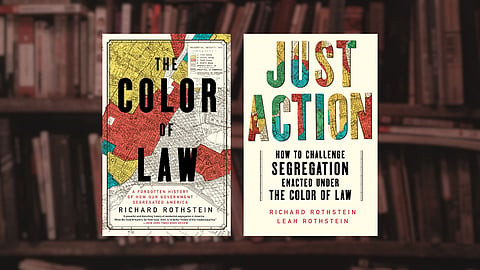'The Color of Law': Housing Experts Talk New Book About Segregation Solution and Celebrate Fair Housing Law
by Agueda Pacheco Flores
Even after Jim Crow laws were overturned following the passing of the Civil Rights Act of 1964, neighborhood segregation persisted throughout the country thanks to intentional federal policies and restrictive local covenants. These discriminatory practices cost Black, Indigenous, and People of Color residents in King County between $12 billion and $34 billion in generational wealth due to redlining and restrictive neighborhood covenants.
Today, discrimination and residential segregation continues. On Nov. 2, two of the country's leading housing policy experts, Richard and Leah Rothstein, will discuss how to fix a segregated housing system at Seattle University. Although the event is sold out, Just Action is available to order at the book's website or from the Elliott Bay Book Company using the event's promo code "HDC" for a 10% discount.
In 2017, housing policy expert Richard Rothstein wrote and released The Color of Law, which walks the reader through the history of residential segregation in the U.S. The book remained on The New York Times Best Sellers list for four weeks. During that time, Rothstein was continuously asked by readers, "But what can we do to fix this?" He realized he needed to write a sequel.
"I was one of the people who asked him, after I heard him talk about it: 'This is all great, but that's history, what do we do now?'" recalled his daughter, Leah Rothstein, during an interview with the Emerald.
Alongside Leah, Richard Rothstein wrote Just Action: How to Challenge Segregation Enacted Under the Color of Law, a practical guide for communities and community organizations looking to tear down the damage of decades-long segregation.
"It's easy to feel like there's nothing to be done, that we don't have much agency or much control over the racial segregation of our communities," said Leah. "I sort of felt that way as well, before working on this book, that it just felt overwhelming and intractable and impossible to make changes on these issues, but in researching this book, not only is there so much we can do, but there's also so much already happening."
Leah, alongside her father, will talk about the many ways communities are proactively fighting against the laws that outlawed Black people from buying homes. One of the ways communities have fought against such laws has been through Washington's House Bill 1474, which was created to address the history of housing discrimination. HB 1474, the Covenant Homeownership Account and Program Act (CHAP), was adopted in April 2023, and in addition to creating a commission to study the ways the State suppressed People of Color from purchasing homes, it will create a fund to assist people who were previously discriminated against or descend from someone who was with down payments for a home. At the book discussion, according to the event description, the Rothsteins will celebrate this "legislative victory" and discuss "what's next on the path toward change."
Aside from growing Black communities' generational wealth, Leah says there are long-lasting benefits to desegregating neighborhoods: A child who grows up in a white neighborhood has far greater life chances than a child who doesn't, from life expectancy to income potential later in life.
"It's also an issue of the resources we have access to," she said. "The segregation of our neighborhoods underlies many of our most serious social problems and racial inequities."
These disproportionate disparities are well-documented. In Seattle, for example, children who grow up in South Park have a life expectancy of 73 years, 10 years less than the children who grow up in affluent neighborhoods to the north.
"It's an obligation of ours as residents of this country, because segregation was caused by unconstitutional actions by our government, so when we know our government takes illegal actions, we have an obligation to fix it," said Leah. "To remedy those actions."
Agueda Pacheco Flores is a journalist focusing on Latinx culture and Mexican American identity. Originally from Quertaro, Mexico, Pacheco is inspired by her own bicultural upbringing as an undocumented immigrant and proud Washingtonian.
📸 Featured Image: Authors and housing policy experts Richard Rothstein and his daughter Leah Rothstein will come to Seattle University to discuss their books on Nov. 2. (Photo courtesy of the authors.)
Before you move on to the next story …
The South Seattle Emerald™ is brought to you by Rainmakers. Rainmakers give recurring gifts at any amount. With around 1,000 Rainmakers, the Emerald™ is truly community-driven local media. Help us keep BIPOC-led media free and accessible.
If just half of our readers signed up to give $6 a month, we wouldn't have to fundraise for the rest of the year. Small amounts make a difference.
We cannot do this work without you. Become a Rainmaker today!
Help keep BIPOC-led, community-powered journalism free — become a Rainmaker today.


